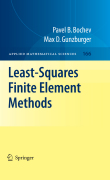
Since their emergence finite element methods have become one of the most versatile and powerful methodologies for the approximate numerical solution of PDEs. Today finite element methods are in common use for incompressible fluid flow, heat, transfer, electromagnetics, and convection-diffusion-reaction problems, to name a few. This book is written with the premise that there is a real, existing need to put least-squares finite elemenet methods on a common mathematically sound foundation. It is intended to give both the researcher and the practitioner a concise guide to the theory and practice of least-square finite element methods, their strengths and weaknesses, established successes, and open problems. Appendices provide results from functional analysis and standard finite theory which are used in various places in the book. INDICE: Part I. Survey of Variational Principles and Associated Finite Element Methods. Classical Variational Methods. Alternative Variational Formulations.- Part II. Abstract Theory of Least-Squares Finite Element Methods. Mathematical Foundations. First-Order Agmon-Douglis-Nirenberg Systems.- Part III. Least-Squares Methods for Elliptic Problems. Basic First-Order Systems. Application to Key Elliptic Problems.- Part IV. Extensions of Least-Squares Methods toother Problems. The Navier-Stokes Equations. Dissipative Time Dependent Problems. Hyperbolic Problems. Control and optimization Problems. Other Topics.- Part V. Supplementary Material.- A. Analysis Tools. B. Finite Element Spaces. C.Discrete Norms and Operators. D. The Complementing Condition.
- ISBN: 978-0-387-30888-3
- Editorial: Springer
- Encuadernacion: Cartoné
- Páginas: 285
- Fecha Publicación: 01/12/2008
- Nº Volúmenes: 1
- Idioma: Inglés
